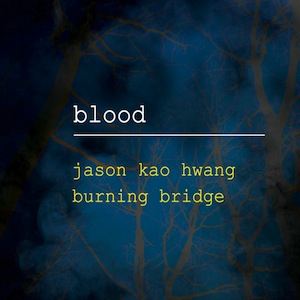Label: True Sound Recordings, 2020
Personnel - Jason Kao Hwang: violin, viola; Ken Filiano: bass; Andrew Drury: drums.
Human Rites Trio is probably my favorite project from violinist Jason Kao Hwang, who, in the recent couple of years has collaborated with pianist Karl Berger and saxophonist Ivo Perelman.
The ingenious rhythm section of this trio, with Ken Filiano on bass and Andrew Drury on drums, also guarantees the firm foundation of Hwang’s octet Burning Bridge and quintet Sing House. The six tracks on the record, which was completed during the Covid-19 pandemic and dedicated to both the victims of this disease and healthcare workers risking their lives out there, sound fresh, following an adaptable model that integrates as many prearranged moves as absorbing improvised moments.
Directional shifts are a constant, and the first two tracks on the record, “Words Asleep Spoken Awake”, parts I and II, are excellent examples. Part I kicks off with the violin in spritely counterpoint with the bowed bass. The percussion becomes well immersed in the conversation, establishing a three-way dialogue. Consecutive terse punctuation on the fiddle serves as both harmonic plank and percussive accompaniment during Filiano’s discourse, and then there’s a collective spiral of sizzling and squeaking violin sounds, bass rambles, and busy drumming, before Filano fixates on an open groove over which Hwang improvises.
Part II pushes the initial hard-swinging gush into a nine-minute improvisatory journey where a furious violin is set against a sturdy rhythmic net. Prior to the unison-filled conclusion, the group embraces darker atmospheres stuffed with deep arco bass slashes, enigmatic sounds emanated from Drury’s floor tom, and plaintive violin cries.
The trio sometimes sounds like an elastic orchestra but the eclectic approach takes them to other worlds than just jazz improv. Take the examples of “Conscious Concave Concrete” and “Battle For the Indelible Truth”, where Hwang explores traditional Asian music. On the former piece he plucks the viola with expressive meaning, painting a clear, bright landscape that includes hushed solo moments and an in-the-pocket good-time bounce totally anchored in the blues. The latter piece, in turn, exhibits an intense rock-flavored tone with call-and-response patterns that are reminiscent of activist chants.
Less upbeat, “2AM” shapes up as a reflection expressed with chamber-esque mournful tones. Yet, it’s not devoid of groove. The recording ends with “Defiance”, where modern classical goes hand in hand with Oriental music, and a triumphant march leads to an explosive drum solo and untroubled abstract interplay.
With 15 years of mutual collaboration and musical understanding, Hwang, Filiano and Drury have developed a natural, fascinating language that is fully expressed on Human Rites Trio.
Grade A-
Favorite Tracks:
02 - Words Asleep Spoken Awake Pt. II ► 05 - Battle For the Indelible Truth ► 06 - Defiance








